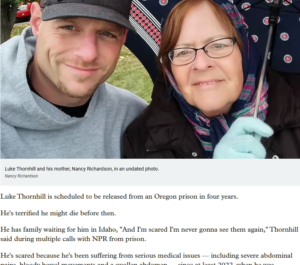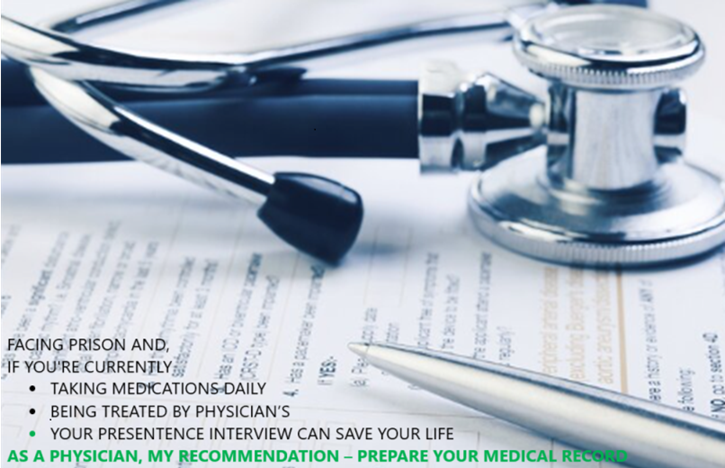OIG: BOP STAFFING SHORTAGES RESULT IN DELAYED ⇒ DENIED ‘MEDICAL CARE.’
YOUR PHYSICIAN’S PSI RECOMMENDATION
*
INCLUDES YOUR MEDICAL RECORD THAT’S COMPREHENSIVE AND EMBEDDED INTO YOUR PERSONAL NARRATIVE.
ONCE IN YOUR PSR, IT MAY IMPACT YOUR SENTENCE, LIFE, AND CHANCES OF IMPLEMENTING THE SECOND LOOK ACT. Dr. Blatstein.

THIS IS NOT NEW.*
*
The Federal Bureau of Prisons has had issues with staffing shortages before January 20, 2024, but these challenges have exploded exponentially since.
S
Project 2025 has ignited a significant internal shift affecting all government agencies, including BOP employees and inmates. Ongoing staffing shortages are worsening along with salary reductions, leading to further staff losses. This situation has a ripple effect on inmates, resulting in delayed or denied medical care and long waiting lists for FSA programs, some of which are temporarily shuttered. Overall,
*A
A
5-2024, DOJ OIG Releases an Inspection of the BOP’s Federal Correctional Institution Sheridan
Healthcare worker shortages are causing significant staff vacancies, resulting in a backlog of 725 laboratory orders and 274 pending X-ray orders. Moreover, a high vacancy rate of correctional officers has led to inadequate supervision of inmates, forcing them to remain in their cells during daytime hours and limiting their access to programs and recreational activities. Staffing shortages in the Psychology Services and Education Departments have also created long wait times for programs like the Residential Drug Abuse Program (RDAP).
8
12-2024, DOJ OIG Releases an Inspection of the BOP’s Federal Medical Center Devens
FMC Devens experienced significant shortages in healthcare and correctional officers, which was particularly troubling for a medical facility. At this institution, 20% of Correctional Services positions, 24% in Health Services, and 39% in Psychology Services were unfilled. After the Clinical Director retired in June 2024, only one physician was available for over 900 inmates.
As a result, Correctional Officers couldn’t complete all required inmate-monitoring rounds, leaving vulnerable inmates unobserved. FSA programs also faced long waiting lists and limited psychologists, risking temporary program shutdowns.
A
COMMON: STAFFING SHORTAGES CREATING DELAYED MEDICAL CARE, AND PSYCHOLOGY STAFF AND TEACHERS SUBBING IN AS CORRECTION STAFF, RESULTING IN DELAYED TO CLOSED FSA PROGRAMS.
a
*
THE #1 THING YOU CAN DO
PREPARE FOR YOUR PRESENTENCE INTERVIEW WITH
YOUR PERSONAL MEDICAL RECORD AND NARRATIVE
*
“Don’t wait to think about sentencing advocacy,” since 99 percent of federal criminal clients will be facing sentencing, start preparing the case for sentencing early on.
Federal Judge Robert N. Scolaa
A
To the person, almost all of you have never been here before, so let me share what I believe are the things I would like you to remember.
a
I trust you have an attorney picked out, so please do what they recommend. That’s why you’re paying the big bucks. If you’ve made the decision to go to trial, that’s completely understandable. It’s crucial to maintain respect during the proceedings. Gather letters that highlight your character, as they can make a positive impact. Don’t lose hope if the outcome isn’t in your favor; remember that only 0.2% of cases lead to acquittal. This isn’t the end of your journey—it’s merely a chapter. You have an excellent attorney by your side, and you may still gain the understanding and sympathy of your judge at sentencing through a prepared, well-written Personal Narrative and Allocution. Stay strong; your story isn’t finished. a
a
The most important person that you are going to first meet is the Probation Officer who will conduct your Presentence Interview. Why? Because judges rely on them to make your sentence and placement recommendations. Before the interview, they will have asked your attorney for you to provide lots of information—tax returns, licenses, diplomas, etc. Judges from across the country have all stated that they (your Judge) will want to hear from you at sentencing. That is called your Allocution. For this to happen smoothly, the process starts with a written narrative (that you’ve written) or your story/autobiography, with a release plan. This takes time, and I hope that your attorney supports the act of you writing your narrative or story. If not, share with them this quote from Federal Judge Robert N. Scola.
a
If you have never been to the doctor or haven’t seen your physician (or dentist) recently, this is your opportunity to get a complete physical with EKG, EEG, or whatever other studies your physician feels are necessary, as well as get your teeth cleaned with x-rays. If you have a health problem, it is best to find this out now, not when you’re inside. The BOP attempts to convince judges, congress, and the press that all medical care is covered – but that is not the case.
A
See these examples, and I have more.
a
a

a
a
a
U.S. District Judge Roy Dalton
The Middle District of Florida wrote that the BOP should be “deeply ashamed” of how it treated the now-deceased inmate Frederick Bardell and held the Federal Bureau of Prisons in Contempt, 2022.
a
a
a

Two years and counting. Inmate says medical delays still plague federal prison in Sheridan, Oregon, Jaclyn Diaz, Sep 1, 2024.
His symptoms began in 2022 at a different facility which consisted of severe abdominal pains, bloody bowel movements, and a swollen abdomen. His stomach on the right side is painful and sticks out like a grapefruit.
-
In 2022, while in Idaho, he underwent a colonoscopy, during which two polyps were removed.
-
Next, he was moved to SeaTac in Seattle and then to the federal facility in Sheridan, Oregon. Still, he hasn’t seen his biopsy results or doctors to review the res or treatment plan, if any.
-
“Nobody can tell me there isn’t something wrong with me.”
a
a
CHRONIC MEDICAL CONDITIONS AND THE MEDICATIONS YOU’VE BEEN TAKING
a
If you have a personal medical file, then please do not wait. All records must be included and reviewed by an expert before they get to your attorney because they know the law; most don’t know medicine.
a
Getting into the details, all medical records include doctors’ records (office, hospital, surgery, pathology, etc.), Labs, Diagnostic Tests (x-ray, CT, MRI, PET, EEG, EKG, etc., [on paper, email CD, and thumb drive]).
a
Current Prescriptions: for medical devices and medications. Are the medications on the BOP Formulary or Non-Formulary List (there is a difference)? If they are not available, what is your plan? Is your attorney familiar with therapeutic Equilavents?
a
Even some BOP medical centers have short medical and correction staff. Therefore, even if it’s available (and cheap), it should be provided, not “arbitrarily changed or reduced.” This occurred to an inmate where a Federal Judge had to step in and have him released from FCI Florence in Florence, Colorado, to the nearest hospital as part of a Compassionate Request for Early Release.
C

M
Make sure your document is thoroughly organized and free of spelling errors before submitting it as part of your Personal Narrative. Deliver this document, along with all requested information, to your Probation Officer at least one week before your scheduled meeting. This allows them to complete their Presentence Worksheet effectively. Now, your medical file may be embedded into your Presentence Report. Then, at sentencing, if there were any issues like medications that are not on their formulary, this is also mentioned in the Presentence Report, noting that the BOP does not take orders from the court regarding any medications or treatments. Last, I was lucky enough to have the judge mention that the required drug was not available and that the BOP would not accept any order from the court. This was good because, if needed, that judge may be willing to consider a Compassionate Release–Second Look Act based on medical reasons.
q
During your meeting, they will have ample time to ask any lingering questions they may have. It is crucial to leave a strong impression during this meeting; it could lead them to recognize that 1) you’ve taken this situation seriously, 2) you value their time, and 3) you are not that same evil person that your Indictment portrays.
a
Ultimately, this favorable perception could translate into a positive remark to your judge, significantly impacting your case.
a
a
OR YOU HAVE
AN ACUTE MEDICAL CONDITION THAT OCCURS WHILE YOUR INCARCERATED
ADVOCATING FOR MEDICAL CARE WHEN IT’S DENIED – WHAT “YOU” & YOUR “LOVED ONES” CAN DO
a
Problems with prison health care are well documented. Delays or substandard health care for prisoners in the U.S. carceral system are not uncommon. In 2023, NPR published a report showing that nearly 5,000 federal prisoners died over the past decade from treatable conditions after not getting timely diagnoses or treatment while incarcerated.
a
I) You’re Coherent, Can Advocate for yourself, and can participate in ADL to some degree.
Become familiar with the Administrative Remedy Process from the very first day of the incident. It is so important to write down every conversation in a journal-type log book, and at some type, start with the BP 8 – BP-11 and then 2241.
a
II) FOR YOUR LOVED ONES, those who cannot perform ADL, PADL, or Advocate For Themselves. You would be well served to get help from loved ones with Power of Attorney.
FIRST: Maintain an organized file to keep track of your loved one’s conversations and care, including dates, names, phone numbers, and steps taken.
a
Request a written detailed description of the issue with contact information for further details. KEEP COPIES OF EVERYTHING.
-
Compose a respectful letter to the warden advocating for your loved one. Certified – Return Receipt.
-
Present the facts, describe the issues, suggest possible solutions, and ask for inquiry, communication, and collaboration. Help is what you’re asking for, and you’ll “await” their reply (I look forward to hearing from you).
-
If a loved one is in jail and requires medical attention, specific actions must be taken to ensure they receive appropriate care.
-
If there is another Grievance, address it.
-
Request a written response from the Warden concerning your loved one’s medical condition and proposed treatment plan.
-
This will provide valuable insights into their health and the measures being taken to address any medical concerns they may have.
-
It’s a good idea to contact your loved one’s treating family doctor for additional support.
-
This could prove particularly beneficial if you have concerns regarding their current treatment plan or feel they aren’t receiving adequate care while incarcerated. The doctor could provide you with a letter to attach containing more insight into their condition and suggest ways to ensure they receive optimal care.
-
By staying informed and advocating for their medical needs, you can help ensure they get the right care – but no promises.
-
You’re creating what I call a Paper Trail, which lets all parties know that someone else is watching.
Contact your member of Congress.
File a Formal Complaint Directly with the Facility and look up the prison contact information.
Contact The BOP Regional Directors (Including The Current BOP Director)
BOP HQ
LOVED ONES ADVOCATING FOR MEDICAL CARE WHEN IT’S DENIED.
The SEICHE Center for Health and Justice Between the Yale School of Medicine and Yale Law School
-
“We know that when family members stay engaged, like when kids are still close to their moms or dads who are incarcerated, when there is a family support system when people return home or even when they’re inside, that the health of the incarcerated person is better,” -Professor Emily Wang, MD, MAS.
A
OVERVIEW OF “MY DAD WAS ILL” ARTICLE
-
Shortened life spans, chronic needs
-
Every year in prison takes two years off a person’s life expectancy, according to research cited by the Prison Policy Initiative.
-
Gnawing fears, troubling stories
-
My father’s first health crisis
-
“There is a constant and consistent fear that if you push too much, if you advocate too much, somehow there will be an equal and opposite force that harms your love done.”
-
No air conditioning
-
Staffing problems, long waits
-
“We know that when family members stay engaged, like when kids are still close to their moms or dads who are incarcerated, when there is a family support system when people return home or even when they’re inside, that the health of More reading, fewer paywalls.
-
Enjoy more free access to the incarcerated person, which is better.”
-
Back to the hospital
A
A
a
III) Caring for the Rapidly Aging Incarcerated Population
It’s Beyond the mission (and expectations) for prisons (state and federal), along with jails, to have the resources for the exploding numbers of aging persons in their institutions, as they face shortages in staffing and a crippling infrastructure. Add to that, Climate Change has resulted in triple-digit temperatures that bring with it medical emergencies, some resulting in lethal outcomes.
The Prison Litigation Reform Act – Incarcerated Persons may be in effect – but in words only. <- Link Works
NIH-HHS Caring for the Rapidly Aging Incarcerated Population: The Role of Policy[iii]. Incarceration accelerates adult aging. This article highlights the challenges older adults face while in correctional and community health systems. Healthcare providers, policymakers, and correctional institutions need to ensure adequate care for incarcerated older adults.
A
IV) MENTAL ILLNESS IN PRISONS AND JAILS
66% of women in prison reported having a history of mental illness, almost twice the percentage of men in prison.
About 2 million times each year, people with serious mental illness are booked into jails. <- Link Works
Well-intentioned mental health courts can struggle to fulfill decades-old promises.
- These diversion programs are meant to keep people with mental illness from being incarcerated.
- Keeping up with the program’s onerous work and community service requirements is daunting for some.
- Advocates, attorneys, clinicians, and researchers say the programs are often expensive, resource-intensive, and serve fewer than 1% of those booked into U.S. jails each year.
- Participants must often meet strict requirements that critics say aren’t treatment-focused, such as regular hearings and drug screenings.
My Comments: A prison’s main job cannot be to house those who are mentally ill, meaning that our justice system needs a second look for those who are suffering from psychiatric illnesses.
PADL[vi] (Prison Activities of Daily Living)
Mild cognitive impairment (MCI), dementia, and mental health conditions, along with diagnoses such as schizophrenia and bipolar disorder[vii] (Di Lorito et al., 2018[viii]), have not yet figured into physical infrastructure when taking into account bunk beds and the lack of accessible bathrooms.
Prison Activities of Daily Living (PADLs) can also lead to violence as correction staff do not understand why someone refuses to move, is disrespectful, or precipitates other inappropriate behavior. This can result in punishment, being placed in the SHU (or isolation), which can have lethal outcomes.


